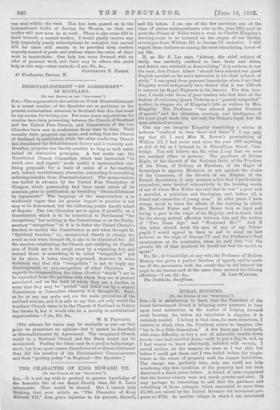THE CHARACTER OF KING EDWARD VII. [To THE EDITOR OF
THE "SPECTATOR.")
SIR,—It is not my wish to pretend to greater knowledge of the domestic life of our Royal Family than Sir S. Lee's informants. That would be absurd. But I cannot help thinking that your article on "The Character of King Edward VII." does grave injustice to his parents, himself, and his tutors. I am one of the few survivors out of the class of eleven undergraduates who in the year 1861 used to meet the Prince of Wales twice a week in Charles Kingsley's drawing-room to be lectured on the reigns of our British sovereigns from William III. to George IV. inclusive. I still regard those lectures as among the most stimulating hours of my life.
If, as Sir S. Lee says, "history, the chief subject of study, was carefully confined to bare facts and dates; and fiction was withheld as demoralizing," it is curious, to say the least, that Prince Albert "should have selected our great English novelist as his son's instructor in his chief subject of study." I can speak from personal knowledge when I say that Kingsley would indignantly have denied that it was difficult to interest his Royal Highness in his lessons. For this, how- ever, I would refer those of your readers who feel hurt at the fashion of criticising Queen Victoria as a " gravely misguided" mother, to chapter xix. of Kingsley's Life as written by Mrs. Kingsley. The Professor "was allowed perfect freedom of speech," and the attention, courtesy, and intelligence of his royal pupil made him not only the Prince's loyal but his most attached servant.
Can any one imagine Kingsley conducting a course of lectures "confined to bare facts and dates " ? I can only say that till I read Miss M. Bowen's presentation of William III. I had never read since the year 1861 anything so full of life as I listened to in Fitzwilliam Street, Cam- bridge. You will believe me, Sir, when I say that we were not confined either to persons. The questions of Divine Right, of the Growth of the National Debt, of the Freedom of the Press, of Bribery at Elections, of the Right of Sovereigns to appoint Ministers or not against the choice of the Commons, of the Growth of our Empire, of the French Revolution (I only mention a few that I particularly remember), were treated exhaustively in the burning words of one of whom Max Muller has said that he was " a poet and a moralist, a politician and theologian, and, before all, a friend and counsellor of young men." In after years I have always loved to trace the effects of the training in which Mr. Herbert Fisher and General Bruce took so loyal and loving a part in the reign of his Majesty, and to thank God for the strong mutual affection between him and the author of "Two Years Ago" and " Westward Ho ! " And if this letter should meet the eyes of any of my fellow- pupils I would appeal to them to call to mind the last lectures on the reign of George IV. and the Professor's final apostrophes at its conclusion when he said that " of the private life of that monarch he would not foul his mouth to speak." No, Sir; at Cambridge, at any rate, the Professor of Modern History was given a perfect freedom of speech, and he made use of the permission, with the result that he did interest his pupil in his lessons and at the same time secured his lifelong The Paddocks, Swaff ham.










































 Previous page
Previous page